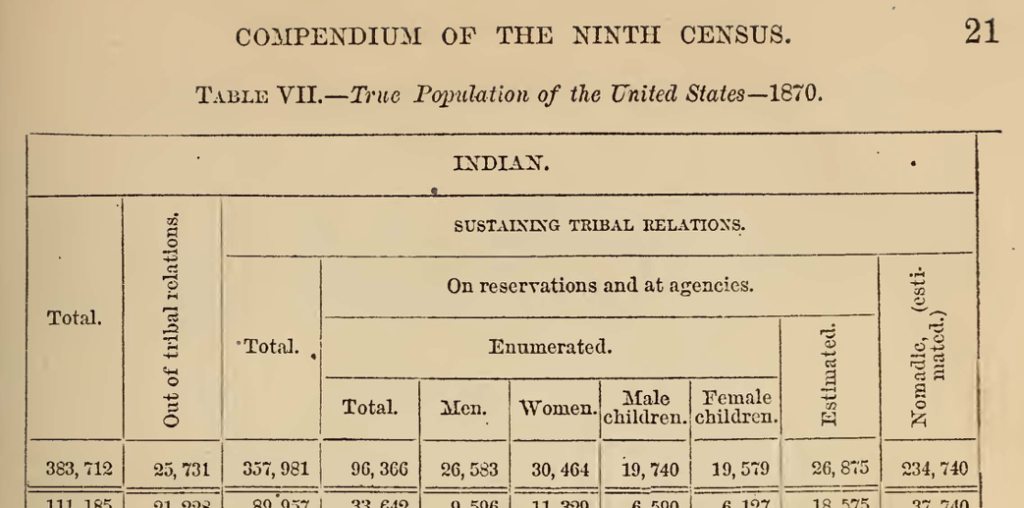
The US Census provides not only interesting demographic statistics. It is of historical importance in itself: the questions asked reflect the social concerns that loom over each census survey. In 1870, the Indian Wars were reviving, perhaps in part because so many military men were out of work after the Civil War. The stereotype of Americans at the time dictates a deep, even vicious hostility to American Indians. The attitude toward Native Americans was far more complex and varied, however.
A comment on the Compendium (3) concerning “Indians Not Taxed” reflects the ambiguous status American Indians occuplied in the late-19th-century United States. [Originally one paragraph, I broke it up for easier reading.]
Indians not taxed, as found in the Constitution and in the census law of 1850, [has] been held for census purposes to apply only to Indians maintaining their tribal relations and living upon Government reservations. The broken bands and the scattered remnants of tribes still to be found in many States of the Union, though generally in a condition of pauperism, have been included in the enumeration of the people. By the fact of breaking away from their tribal relations, they are regarded as having entered the body of citizens and as subject to taxation….
Now, the fact that the Constitution excludes from the basis of representation [in Congress] “Indians not taxed,” affords no possible reason why, in a census which is on its face taken with equal reference to statistical as to political interests, such persons should he excluded from the population of the country. They should, of course, appear separately, so that the provisions of.the Constitution in regard to the apportionment of Representatives may be carried out; but they should appear, nevertheless, as a constituent part of the population of the country, viewed in the light of all social, economical, and moral principles.
An Indian not taxed should, to put it upon the lowest possible ground, be reported in the census just as truly as the vagabond or pauper of the white or the colored race. The fact that he sustains a vague political relation is no reason why he should not he recognized as a human being by a census which counts even the cattle and horses of the country.
The practical exclusion of Indians from the census creates a hiatus which is wholly unnecessary, and which goes to impair that completeness which affords a great part of the satisfaction of any statistical work. With a view, therefore, to reacbing tlie true population of the country as nearly as is practicable, in the absence of distinct authority for the appointment of assistant marshals [census takers] to enumerate the several tribes and bands of Indians, inquiries were conducted extensively through the agents of the Indian Office during the year 1870, the result of which, it is believed, has been to secure a closer approximation to the true numbers of this class of the population than bas ever before been effected.
More on the 1870 US Census, including occupations and kinds of dwellings, and Walt Whitman and Emily Dickinson here
Sources: 3. Compendium of the Ninth Census [1870]